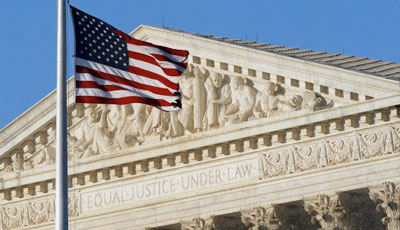Supreme Court enshrines privacy of smartphones

US police must obtain a warrant to search a suspect’s smartphone after the Supreme Court ruled on Wednesday that constitutional privacy protections apply to the often extensive data people keep on the devices in their pockets.
In a unanimous ruling praised by privacy campaigners, the court decided that searching a smartphone was more like downloading the contents of a computer than leafing through someone’s address book.
The fourth amendment bans “unreasonable searches and seizures” but police are usually allowed to search the personal belongings a suspect is carrying. Lower courts had been divided on whether to ban searches of smartphones without a warrant.
Chief Justice John Roberts said the “immense storage capacity” of smartphones made them different from anything else a suspect is holding.
“Modern cell phones are not just another technological convenience. With all they contain and all they may reveal, they hold for many Americans ‘the privacies of life’,” he wrote. “The fact that technology now allows an individual to carry such information in his hand does not make the information any less worthy of the protection for which the Founders fought.”
The Electronic Frontier Foundation, a privacy rights campaign group, described the ruling as “groundbreaking”. Hanni Fakhoury, staff attorney, said: “This should have implications for other forms of government electronic searches and surveillance, tightening the rules for police behaviour and preserving our privacy rights in our increasingly digital world.”
The Constitutional Accountability Center, which like the EFF filed a brief in the case, said it was a good day for the “Bill of Rights”. Doug Kendall, CAC president, said searching cell phones without a warrant was “even more intrusive” than “similar searches of colonial-era homes, which the Founders fought against in the Revolutionary War”.
The case originated from two incidents where police searched phones. In Riley v California, police found incriminating photos and other information on a smartphone connecting a suspect to a shooting, which state courts said was legal. But another case in Boston reached the opposite conclusion, where a call on a suspect’s feature phone (not as advanced as a smartphone) was used to discover where he lived. The evidence in that case was thrown out by a federal appeals court.
The Supreme Court reversed the judgment in the case from California.
Mr Roberts said the ruling would have an impact on the ability of law enforcement agencies to combat crime. “Cell phones have become important tools in facilitating co-ordination and communication among members of criminal enterprises, and can provide valuable incriminating information about dangerous criminals,” he wrote. “Privacy comes at a cost.”
What are the laws in other countries?
Privacy law in major developed countries precedes mobile technology by decades, and many have faced debates and litigation related to conflicts between privacy and security. The rules governing law enforcement’s ability to search citizens’ mobile phones vary significantly across countries, writes Luc Cohen .
In Canada, the Supreme Court ruled in November 2013 that police must obtain a warrant to seize a mobile phone they find on a premises they are legally searching. But a separate decision in February this year ruled that when searching a person who has been arrested, Canadian police may search phones without a warrant if they are not password protected. If they are password protected, police need a warrant.
In the UK, police may search a phone without a warrant if there is “reasonable suspicion” that a crime has occurred – a lower bar than the “probable cause” standard required in the US to obtain a warrant – and London police have technology that enables them to swiftly extract data from suspects’ mobile phones.
In Germany, the Federal Constitutional Court decided in 2005 that unwarranted searches of phones by police unlawfully circumvented protections against wiretapping, and that police must obtain a court order before searching a phone.
Source: FT





























